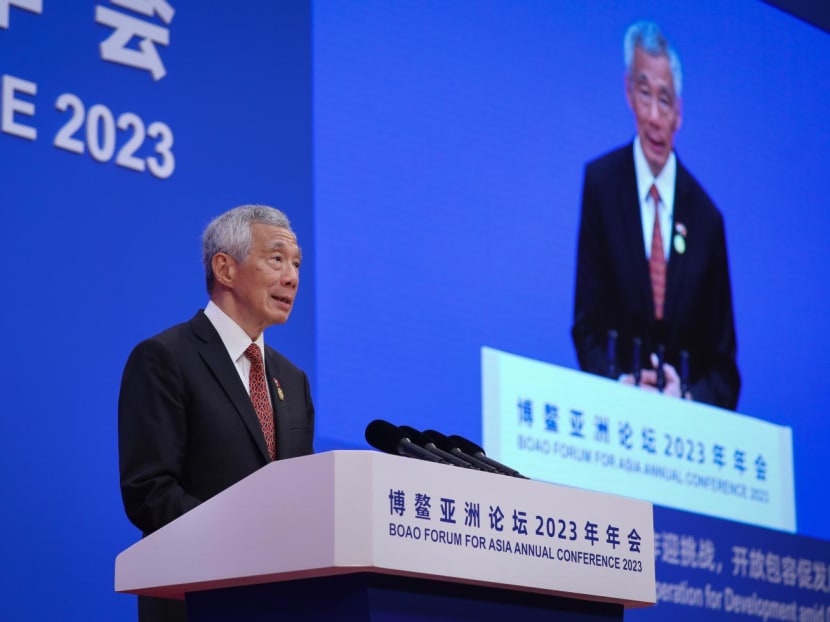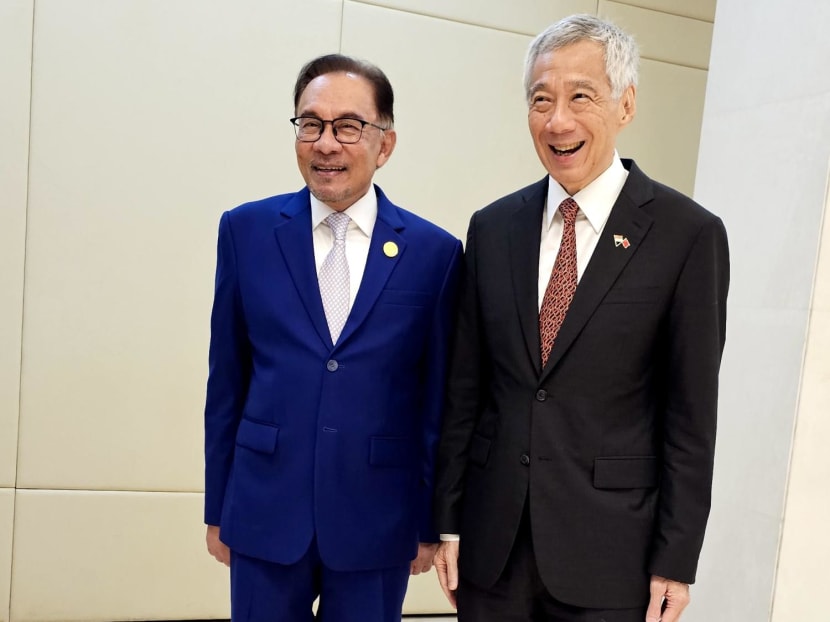Bilateral issues between China and Asian neighbours 'unavoidable', but important to insulate economic relations from differences: PM Lee
BOAO, HAINAN — Bilateral issues between China and its Asian neighbours will arise from time to time, but when it happens, it is important to “insulate economic relations from these difficulties” and continue to do business with each other, said Prime Minister Lee Hsien Loong.

PM Lee Hsien Loong delivered a speech titled: "Towards a stable and prosperous Asia: Deepening cooperation in an uncertain world" at the Boao Forum For Asia Opening Plenary 2023 in Hainan on March 30, 2023.
- Prime Minister Lee Hsien Loong said that China and other Asian countries will not always see eye to eye on some issues
- However, he said that it is important for these countries to “strive to work together pragmatically” for the benefit of its people
- He said this will enable all Asian countries to co-exist peacefully with one another
- They will also enjoy the space and security to chart their own paths towards development and prosperity, he added
- Mr Lee was speaking at the Boao Forum For Asia 2023, an annual conference held in China
BOAO, HAINAN — Bilateral issues between China and its Asian neighbours will arise from time to time, but when it happens, it is important to “insulate economic relations from these difficulties” and continue to do business with each other, said Prime Minister Lee Hsien Loong.
He was speaking at the Boao Forum For Asia Opening Plenary 2023 in the Chinese island province of Hainan on Thursday (March 30), after a speech by China’s Premier Li Qiang.
Mr Lee added that these Asian countries, including China, must “strive to work together pragmatically” for the benefit of its respective citizens even when they may not see eye to eye on some issues.
“This will enable all Asian countries to co-exist peacefully with one another, and enjoy the space and security to chart their own paths towards development and prosperity,” said Mr Lee.
His speech at the forum was titled: “Towards a stable and prosperous Asia: Deepening cooperation in an uncertain world”.
The Boao Forum for Asia, which took place on the fourth day of Mr Lee’s week-long visit to China, has been held annually at Hainan since 2001. It was cancelled in 2020 due to the Covid-19 pandemic.
Aside from Mr Lee, other foreign leaders at the China-led equivalent of the World Economic Forum included Malaysia’s Prime Minister Anwar Ibrahim, Spain's Prime Minister Pedro Sanchez and Prime Minister of Cote d'Ivoire Patrick Achi.
The managing director of the International Monetary Fund Kristalina Georgieva, and Secretary-General of the Association of Southeast Asian Nations (Asean), Dr Kao Kim Hourn, also attended the event.
Mr Lee, who is accompanied by his wife Madam Ho Ching and several Cabinet ministers, is scheduled to meet with Chinese President Xi Jinping, National People’s Congress Chairman Zhao Leji and Premier Li Qiang on Friday and Saturday.
In a speech lasting around 10 minutes, Mr Lee noted that China has become the largest trading partner for almost every Asian country, launching regional and global projects such as the Belt and Road Initiative and the Global Development Initiative.
In return, other Asian countries are also reciprocating China's desire to deepen economic integration, said Mr Lee. Singapore, for example, has cooperated with China on inter-governmental projects such as the Chongqing Connectivity Initiative, which improves connectivity between Western China and Southeast Asia.
On Wednesday, Mr Lee said during a meeting with Guangdong Party Secretary Huang Kunming that Singapore would like to take its relations with China “to the next level”.
Referring to this in his speech on Thursday, Mr Lee said the Republic is "updating and improving" the China-Singapore free trade agreements (FTAs) to raise overall relations to a higher level.
Mr Lee then said that the economic cooperation between China and its Asian neighbours will be “more robust” if it is underpinned by a sound broader relationship, which builds mutual trust and fosters regional stability.
That said, Mr Lee acknowledged that there are many bilateral and regional issues that need to be resolved. He did not state any specific issue in his speech.
However, he added that these differences should be “managed in the spirit of goodwill and co-operation”.
This should also be done peacefully and in accordance with international law, “giving full weight to the perspectives and interests of countries big and small”, said Mr Lee.
“From time to time, national interests will diverge, and bilateral issues will arise,” he said. “This is unavoidable.”
He added: “(But) when this happens, it is important that we insulate our economic relations from these difficulties, and continue to do business with one another.”
‘BIG POWERS, HEAVY RESPONSIBILITY’
Apart from the ties between China and other Asian countries, Mr Lee also highlighted the “worrying state of relations” between the United States and China in his speech.
“Big powers have a heavy responsibility to maintain stable and workable relations with one another, because any clash between them will have grievous consequences, for themselves and the world,” he said.
The world, said Mr Lee, feels the impact of these tensions keenly and he expressed hope that both superpowers can succeed in stabilising their relationship and establish “sufficient mutual trust and respect” to cooperate in areas where their interests are aligned.
“Progress on tackling urgent problems such as climate change, energy and food security, and pandemic preparedness has been severely impeded,” he said.
Economic imperatives, too, are being overshadowed by national security concerns. As such, countries are pursuing “self-reliance and resilience, by on-shoring or friend-shoring their supply chains", which has led to a deepening bifurcation in technological and economic systems.
Mr Lee warned that “this will impose a huge economic cost on countries, as well as further exacerbate rivalries and frictions”.
ASIA SHOULD REMAIN AN OPEN REGION
Against this global backdrop, Mr Lee said that other Asian countries should continue to “promote economic cooperation and good relations" with China.
He later said that while Asian countries, including China, develop such cooperation among themselves, they should also "also cultivate our relations with the US, Europe, and other parts of the world".
For example, despite the tensions between China and the United States, their bilateral trade in goods hit a record high of close to US$700 billion (S$931 billion) last year.
Other Asian countries too, said Mr Lee, are keen to expand economic relations with other regions.
For instance, he said investments by US and European companies in Asia continue to grow, while Asian countries are concluding FTAs with European countries, and even with partners in Latin America.
“Strong economic ties across regions will foster greater interest among more stakeholders to engage constructively in Asia,” said Mr Lee.
This, he said, will not only encourage healthy competition, but spur innovation and partnerships.
He added that it will also moderate tensions when they arise, and “make for a more stable and balanced region”.
Still, Mr Lee said that “whether Asia can realise its promise” will depend on how well countries in Asia maintain stable relations and co-operation.
“As a very important economy in Asia, China has a big role to play in all of this,” said Mr Lee. “(We) welcome China’s commitment to continue opening up its economy, and to continue supporting multilateralism and regional co-operation.”
Following his speech, Mr Lee met Malaysia Prime Minister Anwar Ibrahim on the sidelines of the conference, the Prime Minister's Office said in a statement.
The statement said both leaders "reaffirmed the close and unique bilateral ties" between Singapore and Malaysia, and reviewed the progress made in bilateral cooperation since Mr Anwar’s official visit to Singapore in January this year.

The Prime Minister's Office also said that Mr Lee met Hainan Party Secretary Feng Fei on Thursday afternoon.
The two leaders discussed economic developments in Singapore and Hainan, as well as the potential for further collaboration between both sides.
They also discussed increasing economic exchanges between Hainan and Asean, with Singapore serving as a launchpad for Hainan’s companies into the trading bloc.











